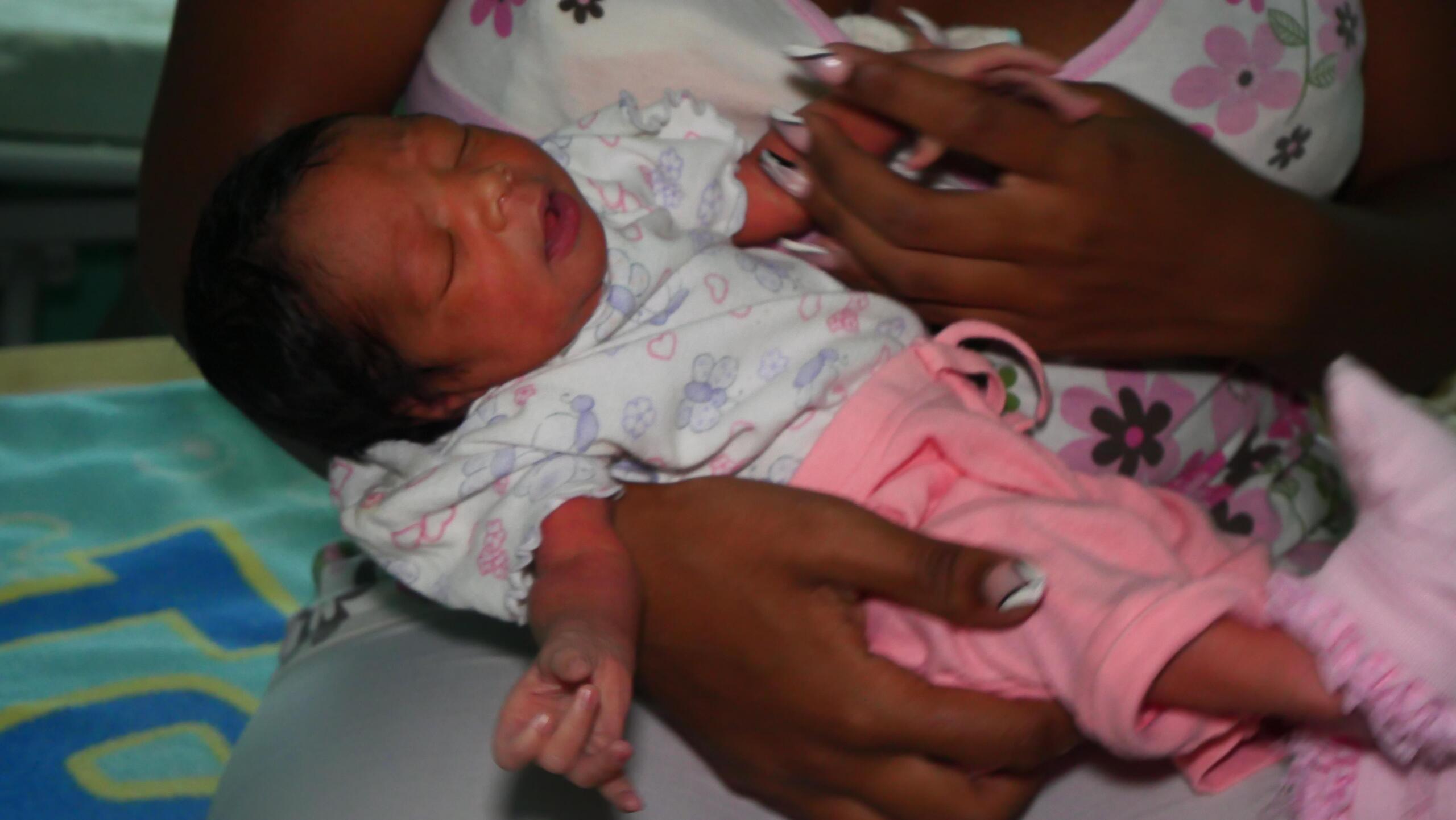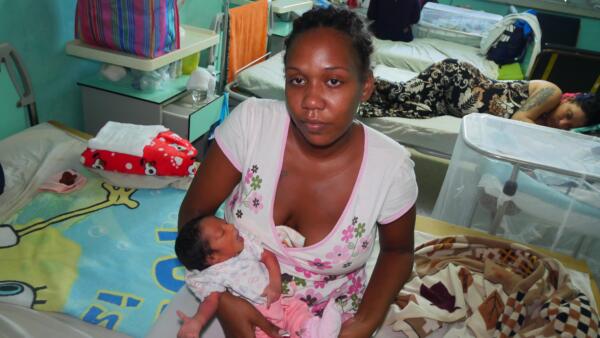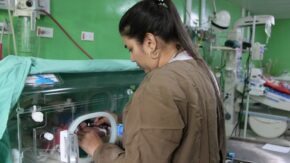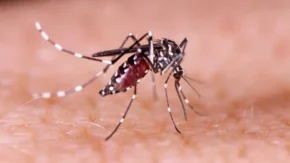The girl who was born on the road

The call came in around 5:00 p.m. last Wednesday, November 12, just as the Integrated Medical Emergency Service (SIUM) team in Sancti Spíritus was adjusting blood pressure monitors and checking the oxygen levels in the ambulances. The phone vibrated with the urgency of a case that can’t wait:
—Out-of-hospital birth, bus stopped. Location: national highway, near Sancti Spíritus.
Ambulance 551 didn’t start: it sped off.
Its lights flashed like someone suddenly opening their eyes. And she—if ambulances had memories—knew this wouldn’t be a typical transfer. There was something in the vibration of the message, a hidden tremor: a premature birth in the middle of the country, with a 20-year-old mother who never imagined giving birth on the seat of a bus at 34 weeks of gestation.
As it advanced with its siren blaring, cutting through the Sancti Spíritus night, the vehicle only heard fragments through the radio: “Young woman… Third child… Nurse and doctor present in the vehicle… The girl was born mid-journey…”
The Trip That Shouldn’t Have Been News
Hours earlier, in Havana, Eglisnelvis Hechevarría Céspedes, with two young children in the eastern part of the country, boarded the Havana-Santiago de Cuba bus with the resigned calm of someone who already knows the hardships of long journeys. There were no signs, no pains, no unusual palpitations.
“I left home as usual, without any symptoms,” she would later recount, still incredulous. “I was going to pick up my older child.”
The bus glided down the road like any other Wednesday, until it ceased to be a Wednesday. First, there was a lower abdominal pain, the kind that mothers recognize but don’t want to admit. Then, a more intense wave. Then, another: “I realized they were contractions,” the young woman recounts.
Eglisnelvis turned to the Mexican man traveling next to her and only managed to ask him for an urgent favor: “Call the driver for me, I feel very ill.”
Then other passengers raised the alarm. The bus stopped, the tension rose like a wave, and the improbable miracle occurred: among the passengers were a nurse and a doctor. A coincidence worth a life.
“They treated me as if I were in a hospital,” she would repeat several times later, because repeating herself was her way of expressing gratitude. “I wanted to name my daughter after them, but in the rush I didn’t get a chance to ask their names.”
The bus wasn’t a delivery room, but that night it acted like one. The dim lights, the hushed murmur of the passengers, the two healthcare professionals guiding every minute, the outstretched hands offering water, support, blankets. And in the heart of that bus that carried stories from all over Cuba, another one was born.
Eglis Saray Arce Hechevarría came into the world amidst miles of travel, and the entire bus applauded.
Arrival at the hospital: the first 24 minutes
When ambulance 551 found the bus stopped on the road, the scene still held the fresh pulse of the birth: an exhausted mother, a tiny baby girl wrapped in whatever was available, astonished faces.
The paramedic lifted the baby with the care he had learned over the years: as if carrying air.
“34 weeks. Premature. Likely low birth weight,” he noted.
The ambulance, then, became a protective womb. The mother and daughter clung to the metal walls of the hospital, like someone clinging to the hope of a second birth. A short time later, the Camilo Cienfuegos Provincial General Hospital opened its doors. An alert team awaited them.
“We’ve never had a case like this before,” says Dr. Manuel López Fuentes, a second-degree specialist in Neonatology and head of the Morbidity Committee for the province, who was the first to receive them: “The baby weighed 2,200 grams. She was 34 weeks premature. But she arrived in stable condition. We ran additional tests, and everything was normal. We observed her for almost 24 hours, and the next day she was with her mother.”
Fifteen years of experience and never a premature birth inside a bus. Never anything like it: “It’s a happy coincidence that those two professionals were traveling on the bus. Thanks to them, the baby arrived in better condition and, fortunately, she didn’t have any complications,” the doctor explained.

The Courage of a 20-Year-Old Mother
Already in her bed at the Provincial Neonatology Unit in Sancti Spíritus, Eglisnelvis recalled the moment she understood that the baby girl would arrive without waiting for her to reach Santiago de Cuba: “I felt fear… I thought about what could happen to her. Not to me, but to her.”
Her husband stayed in Havana, taking care of their second child. Their eldest awaited her in eastern Cuba. As she had decided before this extraordinary journey, she named the baby Eglis Saray, a name inspired—without saying it too loudly—by herself, because something of her own strength had to be preserved.
“We showed the photo to the father, who saw it from Havana,” she says, her eyes welling up with tears. “He hasn’t met her yet, but he’s desperate to see her.”
Then, when she had the chance, she looked directly into the camera. Each word was a bridge: “I tell him and my family to stay calm. I’m fine. The little girl is fine. I miss you all.”
Where life finds a way
Eglis Saray’s cubicle breathes a different kind of silence, not a sad one, but one born of protection.
The tiny baby girl makes her way with the discipline of a warrior. She nurses, sleeps, moves her fingers as if touching the walls of a brand-new house. “She’s under observation. Everything has been favorable, but with premature babies, you have to wait. Every day can bring something new,” explains Dr. López Fuentes.
The teams measure, record, and monitor. The doctors touch only what is absolutely necessary. The mother passes her hand along the glass as if touching a miracle.
In Neonatology, with each passing day, the baby breathes a little more strongly, as if her tiny chest were discovering new reserves of life she didn’t know she possessed, and the prognosis is now beginning to emerge with a clearer light, sustained by medical discipline and the admirable response of a small organism.
The mother, who has lived these days amidst shocks and hope, smiles with a different conviction, like someone who can finally believe that history is moving towards a safe dawn.
A country that followed the story closely
The Havana-Santiago de Cuba trip was forever divided in two: before the birth and after the birth.
Passengers still post comments on social media, the nurse and doctor who were on the bus that day remain heroes; while the driver surely remembers the moment he thought: “What if we don’t arrive in time?”
But they did arrive. Because a bus could be transformed into a delivery room, because an ambulance could become a home, because a hospital could sustain life when life arrives without a manual.
Stories like this don’t win over an entire country because of their rarity. They win it over because they reveal something essential: the enormous, invisible machinery of humanity that moves this archipelago, even in times of so much imitation and scarcity.
And today, in that cubicle of the Camilo Cienfuegos Hospital, a 2,200-gram heart beats, a reminder, without knowing it, that all of Cuba can stop for a newborn.
Eglis Saray Arce Hechevarría didn’t ask to be born on the road, but that first journey marked her. She was born amidst miles of traffic, among many hands, in a country that still knows how to unite when life emerges.


